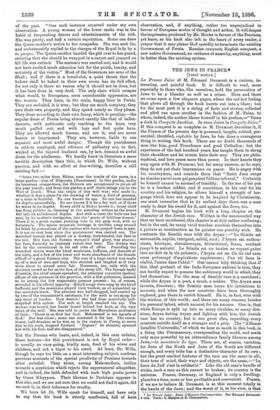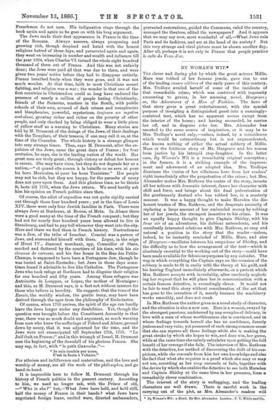THE JEWS IN FRANCE.* [MIST NOTICE.]
La France Juice of M. 2donard Dramont is a carious, in- teresting, and painful book. It is difficult to read, more especially to those who, like ourselves, hold the persecution of Jews to be a blunder as well as a crime. Here and there we come upon a few eloquent pages, where the red-hot feeling that glows all through the book burets out into a blaze ; but for the most part it is a string of facts and stories, collected and piled one upon another in the fashion of M. Taine, to whom, indeed, the author likens himself in his preface,—" Taine a ecrit la Conquele ,Tacobine. Je veux &tire la Conqaete Juive." If this conquest is so complete as M. Dramont describes it, if the France of the present day is governed, taught, robbed, per- secuted, throttled, exploit& by Jews, he has done a courageous thing in writing this book. There are no doubt thousands of men like him, good Frenchmen and good Catholics ; but the experience of the last hundred years has taught them to shrug their shoulders and let events have their way. They are philo- sophical, and love peace more than power. In their hearts they may agree with M. Drumont, but for many reasons, as he says, they do not put their impressions on paper. He is angry with his countrymen, and reminds them that "Saint Jean range lea timides parmi cenx quipeuplent l'abime infernal." Certainly he himself cannot be accused of timidity. In the use of his pen he is a fearless soldier, and if sometimes, in his zeal for his country and his religion, he allows himself a strength of lan- guage which does not appear to be inspired by Christianity, one must remember that in its earliest days there was a man ready to draw his sword for it, and against the Jews, too.
M. Dramont begins his book with a long chapter on the character of the Jewish race. Written in the unconnected way that we have mentioned, this chapter is at first rather confusing; but in the end, its many vivid touches combine themselves into a picture as unattractive as its painter can possibly wish. He contrasts the Semitic race with the Aryan :—" Le Semite eat mercantile, cupide, intrigant, subtil, rus6; l'Aryen eat enthou- siaste, herolque, chevaleresque, desinteresse, franc, confiant jusqu'is la naivete. Le Semite eat nn terrien ne voyant guere rien an-dele de la vie presente; l'Aryen eat un fils du ciel sans cease preoccupe d'aspirations superieures ; run vit dans la realite, l'antre dans rideal." One cannot help thinking that if this ideal portrait of the Indo-European nations is true, they can hardly expect to possess the sublunary world in which they find themselves. For the man of Semitic race is a merchant ; while the Aryan is a poet, a monk, a soldier. The Aryan man invents, discovers ; the Semitic man turns his inventions to account, and when the new countries have been thoroughly explored, goes there to enrich himself. He is, in fact, wise with the wisdom of this world ; and there are many reasons, besides his personal talent, which account for his success. One is, that while Europe is split up into so many rivalries, so many divi- sions, Aryan hating Aryan and fighting with him, the Jewish race has no country, but is one great elan, regarding every creature outside itself as a stranger and a prey. The "Alliance Israelite Universelle," of which we hear so much in this book, is a thing like Freemasonry, overspreading the world, and made only more powerful by an extraordinary family likeness among Jews,—la monotonie du type. There are, of course, varieties, for Jews of the North and Jews of the South are different enough, and every tribe has a distinctive character of its own ; but the great marked features of the race are the same in all; their tone of mind, their ways and objects, are the same,—" La force du Juif c'est in solidarit6." Like the old man's bundle of sticks, such a race as this cannot be broken ; its country is the universe. France, Germany, or England is only a dwelling- place for a time, more or less profitable and convenient. France, if we are to believe M. Drumont, is at this moment totally in the hands of the Jews ; and the worst of it, in his view, is that • La FTaliCil Jam: Essai d'Histoire Con, emporatins. Par Edouard Drum:nit. 2 vols. Paris: 0. Masson, et E. Plammarlan.
Frenchmen do not care. His indignation rings through the book again and again as he goes on with his long argument.
The Jews made their first appearance in France in the time of the Romans. Always usurers, always prospering and growing rich, though despised and hated with the honest religious hatred of those days, and persecuted again and again, they went on increasing in number and wealth and influence till the year 1394, when Charles VI. turned the whole eight hundred thousand of them out of France. And this was not unfairly done ; the Jews were paid all that was due to them, and were given two years' notice before they had to disappear entirely. France breathed freely when they were gone, and it was not much wonder. At that time, faith to most Christians meant fighting, and religion was a war ; the wonder is that one of the first countries in Christendom could so long have endured the presence of nearly a million of people hating Christianity, friends of the Saracens, masters in the South, with public schools of their own, accused of dark crimes and conspiracies and blasphemies, powerful, mysterious, toujours we mystere ambulant, growing richer and richer on the poverty of other people, and only checked by being obliged to wear a little piece of yellow stuff as a warning to Christians. Many stories are told by M. Drat/lout of the doings of the Jews, of their dealings with the Templars, of their treason, if one may call it so, at the time of the Crusades. The whole history is a strange glimpse into very strange times. Then, says M. Drumont, after the ex- pulsion of the Jews, came the great days of France ; for four centuries, he says, she is the leading nation of the world. Her great men are truly great ; through victory or defeat her honour is secure. She may have vices, but they do not degrade her as a nation,—" at quand elle courra B, la bataille ce ne sera ni pour lee bons Mexicains, ni pour les bons Tunisians." Her people may not be rich, but they are happy, for the parasite of usury does not prey upon them. And this glorious time, as he thinks it, lasts till 1791, when the Jews return. We need hardly ask him his opinion on French politics since then.
Of course, the edict of expuslion was not quite rigidly carried out through those four hundred years ; yet in the time of Louis XIV. there were only four Jewish families in Paris. There were always Jews at Bordeaux, at Rouen, at Metz. In Alsace there were a good many at the time of the French conquest; but they had not for nearly four hundred years been allowed to live in Strasbourg, and had to pay toll whenever they went into the city. Here and there we find them in French history. Nostradamus was a Jew, of the tribe of Issachar. Concini was a patron of Jews, and surrounded himself with them. Lopez, in the reign of Henri IV., diamond merchant, spy, Councillor of State, mocked and flattered by the courtiers of his time, with his six chevaux de carrosse, and his fine house in the Rue des Petite. Champs, is supposed to have been a Portuguese Jew, though he was buried at Saint-Eustache ; but Jews in those days some- times found it advisable to live like Catholics. The Portuguese Jews who took refuge at Bordeaux had to disguise their religion for one hundred and fifty years. Among these refugees was Antoinette de Louppes, or Lopez, the mother of Montaigne ; and this, as M. Drumont says, is a fact not without interest for those who believe in heredity. He suggests that the tone of the Bssais, the worldly wisdom, the gentle irony, may have been derived through the ages from the philosophy of Ecclesiastes.
Of course, when 1789 arrives, the spirit of the age can hardly leave the Jews longer under any disabilities. Yet, though the question was brought before the Constituent Assembly in that year, there was so much doubt and argument, so much warning from men who knew the sufferings of Poland and Alsace, ground down by usury, that it was adjourned for the time, and the Jews were not emancipated till September 27th, 1791. "Le Juif etait en Frances" and in this triumph of Israel, M. Drumont sees the beginning of the downfall of his glorious France, She may say, in fact, with " le petit Gavroche :"—
" Je suis tomb& par term,
C'est la faute k Voltaire."
For atheism and indifference and materialism, and the love and worship of money, are all the work of the plailosophes, and go hand-in-hand.
It is impossible here to follow M. Drumont through his history of French politics in the present century. According to him, we need no longer ask, with the Prince of old,. —" Who is she ?" but,—What Jews have held, and hold still, half the money of France in their hands ? what Jews have negotiated foreign loans, excited wars, directed ambassadors, prevented restorations, guided the Commune, ruled the country, managed the theatres, edited the newspapers ? And it appears that we may say now, moat wonderful of all,—What Jews rule Paris and its fashions, and are at the head of its society ? But this very strange and vivid picture must be shown another day. After all, perhaps it is not only in France that people practise is culte du Veau d'or.



































 Previous page
Previous page